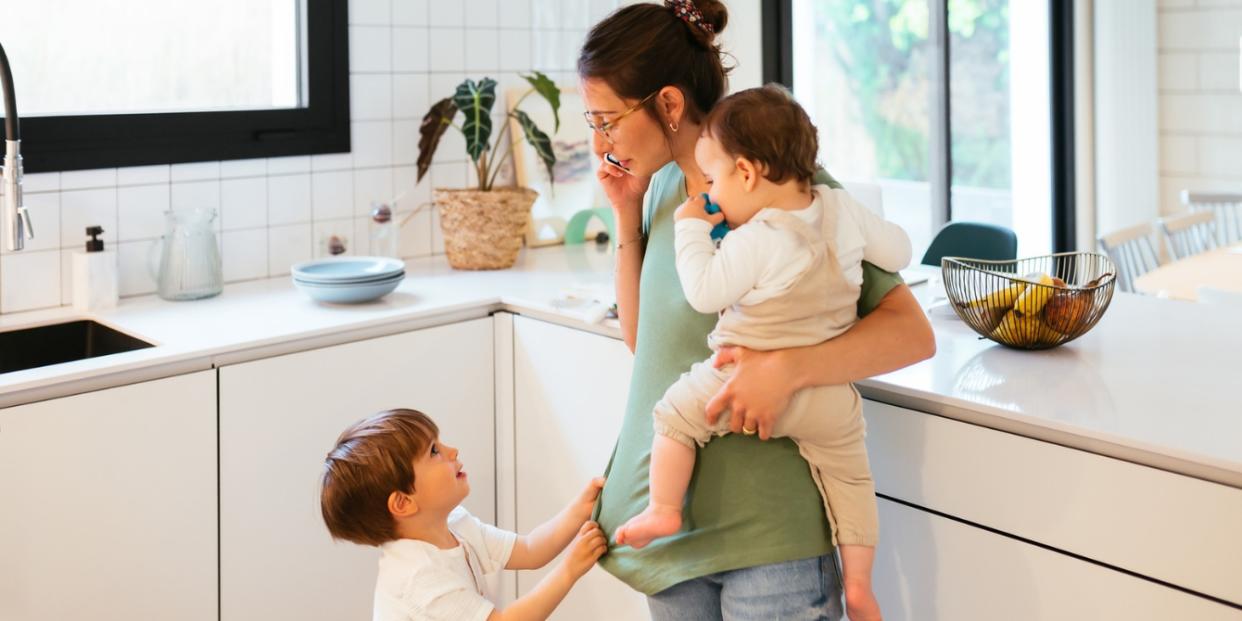Parental burnout: What it is—and what to do about it

You’re doing a lot. You’re taking care of your family, meeting work responsibilities, managing your own emotions while helping your kids manage theirs and dealing with all kinds of stress and uncertainty. Stress levels are rising and American parents are feeling more isolated than ever before. A study from 2022 by The Ohio State University shows that an astonishing 66% of American parents admit to experiencing burnout.
As an executive and life coach who helps working parents and others optimize their lives for work and home, I have supported many clients through parental burnout. Here’s how to identify your symptoms and what to do about it.
Is what you’re feeling burnout?
Burnout is often in reference to professional burnout. That type of burnout is not simply being tired at work or lacking satisfaction in a job. Workplace burnout refers to three specific factors: exhaustion, reduced inefficacy, and depersonalization.
Similarly, parental burnout is rooted in the same three factors. These symptoms are:
Emotional exhaustion: Just the thought of what you need to do for your child(ren) is exhausting.
Reduced parental efficacy: No longer capable of performing usual parenting-related tasks.
Emotional distancing from your child(ren): Pulling back from managing your children’s day-to-day wellbeing and education.
Change in behavior: A marked shift in how you act or feel towards your children.
You can be burnt out from work but be happy and engaged at home or burnt out from parenting responsibilities and be engrossed with work. However, symptoms will bleed into all aspects of your life eventually. Addressing burnout—either professional or parental—is critical.
There are various factors that cause general burnout, some are well-known (being overworked, high-pressure environment) but there are many lesser known causes. These include:
Feeling conflicted about your priorities (e.g., family versus work, etc)
Doing work that is boring or unchallenging
Lack of recognition for your work
No support system or social connections
Perfectionistic tendencies
Need for control; reluctance to delegate
Systemic discrimination and lack of support for marginalized identities: gender, race, caregiver status, class, disabilities, and more
The difference between stress and burnout
A common question is: am I just stressed out or am I really experiencing burnout? If stress is a sense of overwhelm and “too much” of something, burnout is a sense of depletion, running on fumes. The HelpGuide table highlights these differences.
Stress | Burnout |
Characterized by over-engagement | Characterized by disengagement |
Emotions are over-reactive | Emotions are blunted |
Produces urgency and hyperactivity | Produces helplessness and hopelessness |
Loss of energy | Loss of motivation, ideals and hop |
Leads to anxiety disorders | Lead to detachment and depression |
4 ways to prevent and address burnout
The biggest indicators and predictors of who will get burnout, according to a landmark study by Belgium’s Catholique de Louvain, are personality traits of the parents (e.g., high internal expectations and perfectionism). This means there are things you can do right now to help prevent burnout.
1. Be okay with “good enough”
Letting go of what you think should be “perfect” is the first step. This is especially relevant in the current “Intensive Parenting” culture of home baked goods and Instagram DIY projects. This is about shifting perspectives, which requires practice.
What we think should be “perfect” | Replace with “good enough” |
Every moment with my child(ren) needs to be “quality time” | bedtime routine is mindful quality time, 15 minutes of 1-1 playtime |
home cooked meals | meal deliveries, takeout, breakfast for dinner, “short-term” gap solutions |
being available to everyone 24/7 | no answering of non-emergency emails after 6pm; “untouchable” time between 5-8pm |
everything requires my attention | choose 3 big things (safety, independence, fun) and let others go |
2. Create boundaries
Create boundaries around the thing that is causing your burnout: Contain that thing!
Set clear expectations about your availability: Avoid checking email and calls outside work hours.
Bookend your day: Create an end-of-day routine like a quick walk outside, 10-min reflection in your journal about the day, etc.
Have conversations: Boundaries have to be known. If possible, involve your children in boundary setting.
Build positive constraints: Schedule personal activities and cultivate hobbies (e.g., 5:30pm tennis appointment with friends).
3. Take care of your physical well-being
7 hours of sleep: This is the biggest, most impactful thing to focus on.
Avoid or minimize negative outlets: Smoking, drug use, drinking—these all impact sleep and your physical state.
Complete the Stress Response Cycle
Exercise: Every movement counts; 5-minute walks a couple times a day add up.
4. Connect with others (and ask for help)
Parents who feel isolated feel the impacts of parental burnout the hardest. An emotional support system helps negate the impacts of burnout. In addition, that same Belgium study showed burnout risk was highest for parents who have a “difficult time asking for help.”
Reach out to those closest to you: They don’t need to “fix” your problems, just having a person who will listen can be enough.
Limit contact with negative people—full stop: Your reserves are already depleted.
Get an accountability partner: Don’t go at it alone. Make good habits stick by holding each other accountable with a regular check-in.
Outsource/ask for help during burnout: Babysitter(s), friends, family, neighbors, community-based parent groups, gardener, cleaner, parent helper, grocery delivery, etc.
Preventing burnout is an ongoing process that requires consistent effort and attention. Just like with anything else, prevention is easier than recovery.


